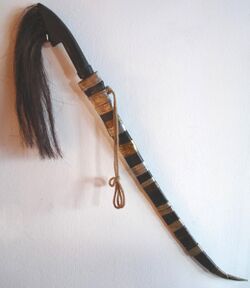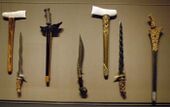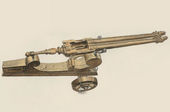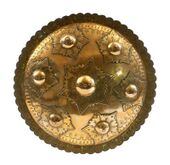Engineering:Surik (sword)
| Surik | |
|---|---|
 A surik from Maubisse, East Timor. | |
| Type | Sword |
| Place of origin | Timor (Timor-Leste, West Timor, Indonesia), Indonesia (Jambi, North Sumatra, West Sumatra) |
| Service history | |
| Used by | Timorese, Batak |
| Specifications | |
| Blade type | Single edge |
| Hilt type | Water buffalo horn |
| Scabbard/sheath | Wood |
The surik is a traditional sword of the island of Timor. The first coat of arms of East Timor depicted crossed suriks.
Description
The surik has a single edge blade. The width of the blade narrows from the base down to the tip. Most of the handle is made from horn, and is decorated with tassels to look tough. Goat's hair or horse's hair is attached to the handle. Carving an eye at the center of the handle is meant to strengthen its supernatural power. The sheath of this sword is made of wood.
A surik sword used along with a long curved shield is called surik samara.[1]
Cultural
For the Belu people of Nusa Tenggara, the surik is considered as a sacred sword. Its supposed supernatural abilities depend on the person who wield the sword; it is believed by the people that no commoner can touch the surik, or the else the sword would turn against that person. Because of that, the community will take counsel to determine who should wield the surik before going to war.
The surik is also used in traditional dance in Timor called, Tari Surik Laleok, which is meant to portray the local warrior's customs. suriks were also worn by the Meos, the foremost fighters, and usually also the most successful head-hunters of the village.[2]
In cases where a dispute is to be settled between two parties in places like Maubara and Ermera, East Timor are known as nahe no lulun biti (to open and close the mat) or tula mesa leten (to put on the table). Once it is decided which party are at fault, a form of compensation is made by a payment of money or valuable objects; and the surik in this case is also accepted.[3]
Surik also refers to another sword used by the Batak people of North Sumatra, as well in other provinces such as West Sumatra and Jambi in Indonesia.
See also
References
- ↑ Tom Therik (2004). Wehali: The Female Land: Traditions of a Timorese Ritual Centre. Pandanus Books. ISBN 17-407-6146-4.
- ↑ Albert G Van Zonneveld (2002). Traditional Weapons of the Indonesian Archipelago. Koninklyk Instituut Voor Taal Land. ISBN 90-5450-004-2. https://www.amazon.com/Traditional-Weapons-Indonesian-Archipelago-Zonneveld/dp/9054500042/ref=sr_1_1?ie=UTF8&qid=1394869874&sr=8-1&keywords=Traditional+Weapons+of+the+Indonesian+Archipelago.
- ↑ Sara Niner (2016). Women and the Politics of Gender in Post-Conflict Timor-Leste: Between Heaven and Earth. Routledge. ISBN 13-173-2789-6.
Further reading
- Bird, Ross (1999). Inside Out East Timor. Herman Press. ISBN 978-0-9577180-3-6.




